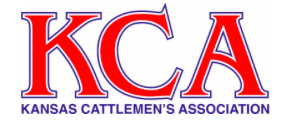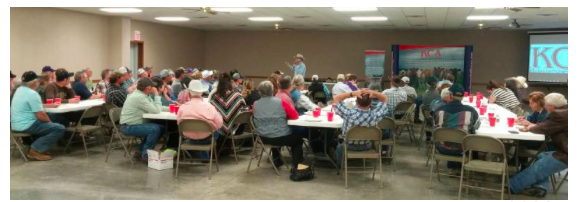KCA: R-Calf USA CEO, Bill Bullard, Speaks at KCA Regional Meeting in Corning, Kansas

Press Release
Contact Tyler Dupy
Telephone 785-238-1483
Cell 785-209-2584
Email cowsrus@kansascattlemen.com
Website www.kansascattlemen.com
March 28, 2017
Members of the Kansas Cattlemen’s Association (KCA) and others from the agriculture community came together in Corning, Kansas during a regional meeting on March 23, 2017. Tyler Dupy, KCA Executive Director, provided a presentation clarifying differences between KCA and other cattlemen’s organizations. Guest speaker, Bill Bullard, R-Calf USA CEO, discussed R-CALF USA’s four priorities of the Trump Administration. A free USA Beef dinner was also served.
Dupy spoke of the importance of understanding the difference between the “Beef Industry” and the “Cattle Production Industry.” “The term “Beef Industry” is a term broadly used to define beef as a processed commodity, but the term, in essence, attempts to consolidate the interests of multiple industries: cattle production, manufacturing, retail, and distribution all into one. The needs and interests of a rural Kansas rancher are far different than those of a packer executive,” Dupy stated.
Dupy touched on the fact that KCA answers to no business or outside entity. “Lacking affiliation with any packer, corporation, or outside entity, KCA is only responsible to the policy set by our producing members,” Dupy affirmed. “This is critical to ensuring that our focus is directed toward the betterment of independent cattle producers, and not to those of big packers and other special interests.”
Bullard spoke of the top four priorities for the Trump Administration R-Calf USA views as critical for cattle producers: reinstating Country of Origin Labeling (COOL), supporting GIPSA rules, aggressively enforcing antitrust laws, and restricting packer ownership of cattle.

When analyzing cattle prices up to and through the implementation of COOL, prices of fat cattle and feeders rose gradually and then somewhat dramatically from October 2008 up until October 2014. A price fallout began after the WTO found in favor of Canada and Mexico for damages as a result of COOL. Further distractions added by various congressional members and organizations targeted and successfully destroyed COOL without any merit. Prices began to collapse, further declining after congressional action was taken to repeal COOL. Bullard argued that COOL significantly benefited cattle producers, and he called for the immediate restoration of COOL as law that reserves the USA Label for only beef that is born, raised, and slaughtered in the U.S.
The second priority Bullard discussed was the enforcement of the Packers and Stockyards Act of 1921. This 96-year-old bill prohibits unfair, unjustly discriminatory or deceptive practices; granting undue or unreasonable preferences or advantages; and does not require a showing of competitive injury. The big 4 packers must be regulated in order to preserve competition.
The third priority was to bring about enforcement and prosecution of antitrust violations. Unchecked mergers, acquisitions, territory apportionment, collusion, and price manipulation have led to a lack of competition and exponential growth in packer margins.
Aggressive enforcement of antitrust laws will help to curtail the degradation of competitive marketing channels for cattle and other livestock.
The fourth and final priority discussed was the passing of legislation to stop packer ownership of cattle. There is a bill which amends the Packers and Stockyards Act of 1921 to prohibit livestock packers from owning, controlling, or feeding livestock to such an extent that the producer no longer materially participates in the management of the operation with respect to the production of the livestock. The bill includes exceptions for: (1) livestock held for not more than seven days before slaughter; (2) certain cooperatives that own, control, or feed livestock and provide such livestock for slaughter; (3) packers that are not required to report price and quantity information on each reporting day; or (4) packers that own one livestock processing plant.
The meeting wrapped up with a question and answer session where attendees were given the opportunity to ask questions and provide remarks to R-Calf USA and Kansas Cattlemen’s Association. Approximately 85 people attended the meeting.
“We put these meetings together to provide awareness to producers on the various issues affecting their industry, be it policy and regulation, animal health and nutrition, marketing, and more. Staying informed and engaged is well worth the time taken, and we encourage increased participation by the independent cattle production community,” stated Jodie McNutt, KCA Administrative Coordinator.
Proud sponsors of the Corning Regional Meeting include: St. Marys State Bank, Marysville Livestock Auction, Inc., Wetmore Veterinary Service, Nemaha County COOP, Trailers 4 U, HydraBed by Triple C. Inc., Farview Farms Meat Company, Rocking M Trailer Sales, Key Feeds, Kansas Cattlemen’s Association, Gee Tire, Inc., First Heritage Bank, Holton Farm & Home, Midwest Crop Insurance, and Jackson Farmers, Inc.